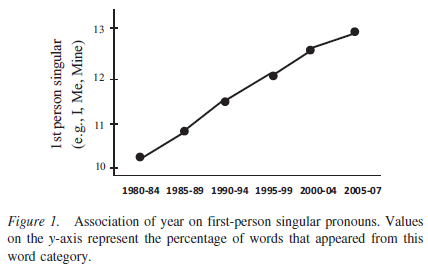Let me count the ways
Cosma Shalizi, "Lyric poetry in Pluto's Republic", 5/8/2011, considers DeWall et al. on pop-culture pronouns in the light of genre and style differences:
The empirical basis for inferring narcissism from using first person singular pronouns appears to be Robert Raskin and Robert Shaw, "Narcissism and the Use of Personal Pronouns", Journal of Personality 56 (1988): 393–404. This shows that, over twenty years ago, there was a modest positive correlation (+0.26) between scores on a quiz intended to measure narcissism, and how often 48 UC Santa Cruz undergrads used first-person singular pronouns in extemporized five minute monologues. Top 100 songs are not spontaneous monologues by undergrads looking for a painless way to get $5 and/or check off a Psych. 1 requirement, and DeWall et al. offer no evidence that this correlation generalizes to any other context. In particular they offer no reason to think that differences over time, as language and culture changes, should be explained in the same way as these differences across people, at a single time and in a single school.
Read the rest of this entry »





